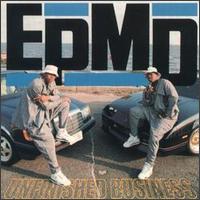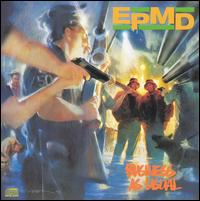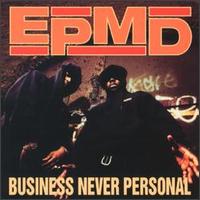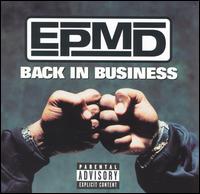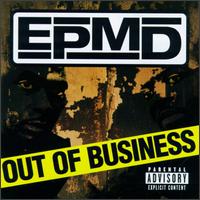 In just a few short years, the Notorious B.I.G. went from a Brooklyn street hustler to the savior of East Coast hip-hop to a tragic victim of the culture of violence he depicted so realistically on his records. His all-too-brief odyssey almost immediately took on mythic proportions, especially since his murder followed the shooting of rival Tupac Shakur by only six months. In death, the man also known as Biggie Smalls became a symbol of the senseless violence that plagued inner-city America in the waning years of the 20th century. Whether or not his death was really the result of a much-publicized feud between the East and West Coast hip-hop scenes, it did mark the point where both sides stepped back from a rivalry that had gone too far.
In just a few short years, the Notorious B.I.G. went from a Brooklyn street hustler to the savior of East Coast hip-hop to a tragic victim of the culture of violence he depicted so realistically on his records. His all-too-brief odyssey almost immediately took on mythic proportions, especially since his murder followed the shooting of rival Tupac Shakur by only six months. In death, the man also known as Biggie Smalls became a symbol of the senseless violence that plagued inner-city America in the waning years of the 20th century. Whether or not his death was really the result of a much-publicized feud between the East and West Coast hip-hop scenes, it did mark the point where both sides stepped back from a rivalry that had gone too far.Hip-hop's self-image would never be quite the same, and neither would public perception. The aura of martyrdom that surrounds the Notorious B.I.G. sometimes threatens to overshadow his musical legacy, which was actually quite significant. Helped by Sean "Puffy" Combs' radio-friendly sensibility, Biggie re-established East Coast rap's viability by leading it into the post-Dr. Dre gangsta age. Where fellow East Coasters the Wu-Tang Clan slowly built an underground following, Biggie crashed onto the charts and became a star right out of the box. In the process, he helped Combs' Bad Boy label supplant Death Row as the biggest hip-hop imprint in America, and also paved the way to popular success for other East Coast talents like Jay-Z and Nas. Biggie was a gifted storyteller with a sense of humor and an eye for detail, and his narratives about the often violent life of the streets were rarely romanticized; instead, they were told with a gritty, objective realism that won him enormous respect and credibility. The general consensus in the rap community was that when his life was cut short, sadly, Biggie was just getting started.Read More
The Notorious B.I.G. - Ready to Die (Sep 13, 1994: Bad Boy)
 The album that reinvented East Coast rap for the gangsta age, Ready to Die made the Notorious B.I.G. a star, and vaulted Sean "Puffy" Combs' Bad Boy label into the spotlight as well. Today it's recognized as one of the greatest hardcore rap albums ever recorded, and that's mostly due to Biggie's skill as a storyteller. His raps are easy to understand, but his skills are hardly lacking — he has a loose, easy flow and a talent for piling multiple rhymes on top of one another in quick succession. He's blessed with a flair for the dramatic, and slips in and out of different contradictory characters with ease. Yet, no matter how much he heightens things for effect, it's always easy to see elements of Biggie in his narrators and of his own experience in the details; everything is firmly rooted in reality, but plays like scenes from a movie. A sense of doom pervades his most involved stories: fierce bandits ("Gimme the Loot"), a hustler's beloved girlfriend ("Me & My Bitch"), and robbers out for Biggie's newfound riches ("Warning") all die in hails of gunfire. The album is also sprinkled with reflections on the soul-draining bleakness of the streets — "Things Done Changed," "Ready to Die," and "Everyday Struggle" are powerfully affecting in their confusion and despair. Not everything is so dark, though; Combs' production collaborations result in some upbeat, commercial moments, and typically cop from recognizable hits: the Jackson 5's "I Want You Back" on the graphic sex rap "One More Chance," Mtume's "Juicy Fruit" on the rags-to-riches chronicle "Juicy," and the Isley Brothers' "Between the Sheets" on the overweight-lover anthem "Big Poppa." Producer Easy Mo Bee's deliberate beats do get a little samey, but it hardly matters: this is Biggie's show, and by the time "Suicidal Thoughts" closes the album on a heartbreaking note, it's clear why he was so revered even prior to his death.
The album that reinvented East Coast rap for the gangsta age, Ready to Die made the Notorious B.I.G. a star, and vaulted Sean "Puffy" Combs' Bad Boy label into the spotlight as well. Today it's recognized as one of the greatest hardcore rap albums ever recorded, and that's mostly due to Biggie's skill as a storyteller. His raps are easy to understand, but his skills are hardly lacking — he has a loose, easy flow and a talent for piling multiple rhymes on top of one another in quick succession. He's blessed with a flair for the dramatic, and slips in and out of different contradictory characters with ease. Yet, no matter how much he heightens things for effect, it's always easy to see elements of Biggie in his narrators and of his own experience in the details; everything is firmly rooted in reality, but plays like scenes from a movie. A sense of doom pervades his most involved stories: fierce bandits ("Gimme the Loot"), a hustler's beloved girlfriend ("Me & My Bitch"), and robbers out for Biggie's newfound riches ("Warning") all die in hails of gunfire. The album is also sprinkled with reflections on the soul-draining bleakness of the streets — "Things Done Changed," "Ready to Die," and "Everyday Struggle" are powerfully affecting in their confusion and despair. Not everything is so dark, though; Combs' production collaborations result in some upbeat, commercial moments, and typically cop from recognizable hits: the Jackson 5's "I Want You Back" on the graphic sex rap "One More Chance," Mtume's "Juicy Fruit" on the rags-to-riches chronicle "Juicy," and the Isley Brothers' "Between the Sheets" on the overweight-lover anthem "Big Poppa." Producer Easy Mo Bee's deliberate beats do get a little samey, but it hardly matters: this is Biggie's show, and by the time "Suicidal Thoughts" closes the album on a heartbreaking note, it's clear why he was so revered even prior to his death.Click To Download
The Notorious B.I.G. - Life After Death (Mar 25, 1997: Bad Boy)
 It may have taken the Notorious B.I.G. a few years to follow up his milestone debut, Ready to Die (1994), with another album, but when he did return with Life After Death in 1997, he did so in a huge way. The ambitious album, intended as somewhat of a sequel to Ready to Die, picking up where its predecessor left off, sprawled across the span of two discs, each filled with music, 24 songs in all. You'd expect any album this sprawling to include some lackluster filler. That's not really the case with Life After Death, however. Like 2Pac's All Eyez on Me from a year before, an obvious influence, Biggie's album made extensive use of various producers — DJ Premier, Easy Mo Bee, Clark Kent, RZA, and more of New York's finest — resulting in a diverse, eclectic array of songs. Plus, Biggie similarly brought in various guest rappers — Jay-Z, Lil' Kim, Bone Thugs, 132295Too $horf>, L.O.X., Mase — a few vocalists — R. Kelly, Angela Winbush, 112 — and, of course, Puff Daddy, who is much more omnipresent here than on Ready to Die, where he mostly remained on the sidelines. It's perhaps Puffy himself to thank for this album's biggest hits: "Mo Money Mo Problems," "Hypnotize," "Sky's the Limit," three songs that definitely owe much to his pop touch. There's still plenty of the gangsta tales on Life After Death that won Biggie so much admiration on the streets, but it's the pop-laced songs that stand out as highlights. In hindsight, Biggie couldn't have ended his career with a more fitting album than Life After Death. Over the course of only two albums, he achieved every success imaginable, perhaps none greater than this unabashedly over-reaching success. Ready to Die is a milestone album, for sure, but it's nowhere near as extravagant or epic as Life After Death.
It may have taken the Notorious B.I.G. a few years to follow up his milestone debut, Ready to Die (1994), with another album, but when he did return with Life After Death in 1997, he did so in a huge way. The ambitious album, intended as somewhat of a sequel to Ready to Die, picking up where its predecessor left off, sprawled across the span of two discs, each filled with music, 24 songs in all. You'd expect any album this sprawling to include some lackluster filler. That's not really the case with Life After Death, however. Like 2Pac's All Eyez on Me from a year before, an obvious influence, Biggie's album made extensive use of various producers — DJ Premier, Easy Mo Bee, Clark Kent, RZA, and more of New York's finest — resulting in a diverse, eclectic array of songs. Plus, Biggie similarly brought in various guest rappers — Jay-Z, Lil' Kim, Bone Thugs, 132295Too $horf>, L.O.X., Mase — a few vocalists — R. Kelly, Angela Winbush, 112 — and, of course, Puff Daddy, who is much more omnipresent here than on Ready to Die, where he mostly remained on the sidelines. It's perhaps Puffy himself to thank for this album's biggest hits: "Mo Money Mo Problems," "Hypnotize," "Sky's the Limit," three songs that definitely owe much to his pop touch. There's still plenty of the gangsta tales on Life After Death that won Biggie so much admiration on the streets, but it's the pop-laced songs that stand out as highlights. In hindsight, Biggie couldn't have ended his career with a more fitting album than Life After Death. Over the course of only two albums, he achieved every success imaginable, perhaps none greater than this unabashedly over-reaching success. Ready to Die is a milestone album, for sure, but it's nowhere near as extravagant or epic as Life After Death.Click To Download: CD-1, CD-2
The Notorious B.I.G. - Born Again (Dec 7, 1999: Bad Boy)
 Considering it was released almost three years after his death, it'd be easy to dismiss the Notorious B.I.G.'s third album as a cash-in or merely a tribute album, similar to Puff Daddy's No Way Out. Fact is, Born Again includes a lot of previously unheard material from Biggie, and guest spots from Busta Rhymes, Redman and Method Man, Missy Elliott, Ice Cube, and Snoop Dogg work better than could be expected. It's difficult to say where all this material came from, but it's probable that the productions were simply arranged around old rhymes from Biggie himself. On most tracks, he takes a spotlight and then the guest rapper comes in. Thanks to executive producer Puff Daddy, it'd be easy to fool those not into hip-hop that Notorious B.I.G. was still alive. The outro, a spoken-word reminiscence by Voletta Wallace (his mother) is a bit touching but also a bit ghoulish. For B.I.G. fans, this is another must-have, but for anyone who thinks the rap industry routinely goes too far in pursuit of the almighty dollar, Born Again is yet further proof.
Considering it was released almost three years after his death, it'd be easy to dismiss the Notorious B.I.G.'s third album as a cash-in or merely a tribute album, similar to Puff Daddy's No Way Out. Fact is, Born Again includes a lot of previously unheard material from Biggie, and guest spots from Busta Rhymes, Redman and Method Man, Missy Elliott, Ice Cube, and Snoop Dogg work better than could be expected. It's difficult to say where all this material came from, but it's probable that the productions were simply arranged around old rhymes from Biggie himself. On most tracks, he takes a spotlight and then the guest rapper comes in. Thanks to executive producer Puff Daddy, it'd be easy to fool those not into hip-hop that Notorious B.I.G. was still alive. The outro, a spoken-word reminiscence by Voletta Wallace (his mother) is a bit touching but also a bit ghoulish. For B.I.G. fans, this is another must-have, but for anyone who thinks the rap industry routinely goes too far in pursuit of the almighty dollar, Born Again is yet further proof.Click To Download
The Notorious B.I.G. - Duets: The Final Chapter
 The weight of Notorious B.I.G.'s legacy is so profound that most major rap MCs and R&B singers alive — and some who are dead — are willing to be attached to it in whatever form possible. It could also be argued that anyone with the means is more than willing to profit from it in a monetary way. Here's Duets: The Final Chapter, released just before Christmas Day 2005, following 1999's Born Again, which was released just before Christmas Day 1999. Like Born Again, Duets takes bits of unused material from the late legend, and that can entail full-blown verses, looped declarations, or punctuative interjections. On some tracks, Biggie's presence is no more prominent than a handclap or a snare hit. Check the lead track "It Has Been Said," where he's limited to "what," "ungh," "yeah," "ha-ha," "uh-huh." If you can get past the fact that a lot of tracks barely feature the headliner, or listen without imagining the original contexts of the patched-together scraps, Duets can be sporadically riveting. The list of guests is overwhelming, with Jay-Z, Nas, Mary J. Blige, Faith Evans, R. Kelly, T.I., Slim Thug, Eminem, Lil Wayne, Missy Elliott, the Clipse, Snoop Dogg, and Freeway representing roughly half of the involved. Only a few tracks contain significant Biggie contributions, and it's not as if they provide any further insight or add to his long-established legend. Many of his vocals are not pulled from professional studio-quality recordings, which only makes them sound more displaced. Perhaps Korn's Jonathan Davis put it best when he told Billboard about the project: "It's f*ckin' weird to be doing a song with someone who is deceased!" His description applies to what it's like to listen to the disc.
The weight of Notorious B.I.G.'s legacy is so profound that most major rap MCs and R&B singers alive — and some who are dead — are willing to be attached to it in whatever form possible. It could also be argued that anyone with the means is more than willing to profit from it in a monetary way. Here's Duets: The Final Chapter, released just before Christmas Day 2005, following 1999's Born Again, which was released just before Christmas Day 1999. Like Born Again, Duets takes bits of unused material from the late legend, and that can entail full-blown verses, looped declarations, or punctuative interjections. On some tracks, Biggie's presence is no more prominent than a handclap or a snare hit. Check the lead track "It Has Been Said," where he's limited to "what," "ungh," "yeah," "ha-ha," "uh-huh." If you can get past the fact that a lot of tracks barely feature the headliner, or listen without imagining the original contexts of the patched-together scraps, Duets can be sporadically riveting. The list of guests is overwhelming, with Jay-Z, Nas, Mary J. Blige, Faith Evans, R. Kelly, T.I., Slim Thug, Eminem, Lil Wayne, Missy Elliott, the Clipse, Snoop Dogg, and Freeway representing roughly half of the involved. Only a few tracks contain significant Biggie contributions, and it's not as if they provide any further insight or add to his long-established legend. Many of his vocals are not pulled from professional studio-quality recordings, which only makes them sound more displaced. Perhaps Korn's Jonathan Davis put it best when he told Billboard about the project: "It's f*ckin' weird to be doing a song with someone who is deceased!" His description applies to what it's like to listen to the disc.Click To Download
The Notorious B.I.G. vs. Frank Sinatra - Blue Eyes Meets Bed Stuy
The Mixtapes:
The Notorious B.I.G. - Biggie Smalls Live (Jul 20, 2006: Jarobi)
The Notorious B.I.G. - Unsolved Mysteries 1
Notorious B.I.G. & Jay-Z - The Commission (2006)
Notorious B.I.G. - Well Always Love Big Poppa (Bootleg 2006)
The Notorious B.I.G. - Biggie Smalls Live (Jul 20, 2006: Jarobi)
The Notorious B.I.G. - Unsolved Mysteries 1
Notorious B.I.G. & Jay-Z - The Commission (2006)
Notorious B.I.G. - Well Always Love Big Poppa (Bootleg 2006)
Leave your comment to support.Enjoy!
And remember you must support artists go and buy this albums.

 Christopher E. Martin (born March 21, 1966), better known as DJ Premier (and Premo or Primo as his fans, fellow musicians and critics call him sometimes), is a prominent American hip hop producer and DJ, and the instrumental half of the duo Gang Starr, together with MC Guru on the lyrical side. Contrary to popular belief, DJ Premier is not a founding member of Gang Starr. Following an invitation by Guru, he joined the 1987 founded group in 1989.No more than three producers (Dr. Dre, RZA, and Prince Paul) can test DJ Premier's status as the most important trackmaster of the '90s, and no style is more distinctive. Aggressive and raw, a Premier track was an instantly recognizable soundclash of battling loops and heavy scratching — all of them perfectly timed — that evoked the sound of Brooklyn better than anyone. Besides helming tracks for his main concern, Gang Starr, since their 1989 debut, Premier's productions appeared on many of the East Coast's most important records: Nas' Illmatic, the Notorious B.I.G.'s Ready to Die, Jay-Z's Reasonable Doubt, Jeru the Damaja's The Sun Rises in the East, and Mos Def's Black on Both Sides.Premier, born Chris Martin, spent time in Brooklyn and Houston while growing up, and studied computer science at Prairie View A&M outside Houston. Known as Waxmaster C, he'd already learned to play a variety of instruments and also managed a record store. After moving back to Brooklyn, around 1987-1988 he came into contact with Guru, a Boston native. Guru had already formed a group named Gang Starr two years earlier (and recorded with the 45 King), but his former partner, Mike Dee, had returned to Boston. DJ Premier and Guru signed to Wild Pitch and released a debut single ("Manifest") and album (No More Mr. Nice Guy). Gang Starr's interest in melding hip-hop with jazz informed the record, and they were invited to add to the soundtrack for Spike Lee's 1990 film Mo' Better Blues. Their subsequent work was much more mature and unified, with a pair of instant East Coast classics (1991's Step in the Arena and 1992's Daily Operation) arriving in short order.DJ Premier had been working with other vocalists for years, and his productions for the 1990 landmark Funky Technician by Lord Finesse and DJ Mike Smooth cemented his status as one of the best producers around. He soon began recording exclusively at D&D Studios, a spot soon to become a shrine for hip-hop fans (thanks in large part to his own work). The year 1994 was a huge one for Premier, probably the best year for any rap producer ever; in addition to dropping another Gang Starr classic, Hard to Earn, his productions appeared on five-star, all-time classics by Nas (Illmatic), the Notorious B.I.G. (Ready to Die), and Jeru the Damaja (The Sun Rises in the East), as well as Big Daddy Kane and Branford Marsalis' Buckshot LeFonque project. Though his workload dropped off considerably during the late '90s, he still managed to place tracks on three of the first four Jay-Z albums, and returned in force with the new millennium, including shots with Common, D.I.T.C., D'Angelo, Jadakiss, and Snoop Dogg.
Christopher E. Martin (born March 21, 1966), better known as DJ Premier (and Premo or Primo as his fans, fellow musicians and critics call him sometimes), is a prominent American hip hop producer and DJ, and the instrumental half of the duo Gang Starr, together with MC Guru on the lyrical side. Contrary to popular belief, DJ Premier is not a founding member of Gang Starr. Following an invitation by Guru, he joined the 1987 founded group in 1989.No more than three producers (Dr. Dre, RZA, and Prince Paul) can test DJ Premier's status as the most important trackmaster of the '90s, and no style is more distinctive. Aggressive and raw, a Premier track was an instantly recognizable soundclash of battling loops and heavy scratching — all of them perfectly timed — that evoked the sound of Brooklyn better than anyone. Besides helming tracks for his main concern, Gang Starr, since their 1989 debut, Premier's productions appeared on many of the East Coast's most important records: Nas' Illmatic, the Notorious B.I.G.'s Ready to Die, Jay-Z's Reasonable Doubt, Jeru the Damaja's The Sun Rises in the East, and Mos Def's Black on Both Sides.Premier, born Chris Martin, spent time in Brooklyn and Houston while growing up, and studied computer science at Prairie View A&M outside Houston. Known as Waxmaster C, he'd already learned to play a variety of instruments and also managed a record store. After moving back to Brooklyn, around 1987-1988 he came into contact with Guru, a Boston native. Guru had already formed a group named Gang Starr two years earlier (and recorded with the 45 King), but his former partner, Mike Dee, had returned to Boston. DJ Premier and Guru signed to Wild Pitch and released a debut single ("Manifest") and album (No More Mr. Nice Guy). Gang Starr's interest in melding hip-hop with jazz informed the record, and they were invited to add to the soundtrack for Spike Lee's 1990 film Mo' Better Blues. Their subsequent work was much more mature and unified, with a pair of instant East Coast classics (1991's Step in the Arena and 1992's Daily Operation) arriving in short order.DJ Premier had been working with other vocalists for years, and his productions for the 1990 landmark Funky Technician by Lord Finesse and DJ Mike Smooth cemented his status as one of the best producers around. He soon began recording exclusively at D&D Studios, a spot soon to become a shrine for hip-hop fans (thanks in large part to his own work). The year 1994 was a huge one for Premier, probably the best year for any rap producer ever; in addition to dropping another Gang Starr classic, Hard to Earn, his productions appeared on five-star, all-time classics by Nas (Illmatic), the Notorious B.I.G. (Ready to Die), and Jeru the Damaja (The Sun Rises in the East), as well as Big Daddy Kane and Branford Marsalis' Buckshot LeFonque project. Though his workload dropped off considerably during the late '90s, he still managed to place tracks on three of the first four Jay-Z albums, and returned in force with the new millennium, including shots with Common, D.I.T.C., D'Angelo, Jadakiss, and Snoop Dogg..JPG)


 DJ Premier Presents - Checc Ya Mail (2005)
DJ Premier Presents - Checc Ya Mail (2005)
 Mos Def (born Dante Terrell Smith on December 11, 1973) is a critically acclaimed rapper and actor. He was born in Brooklyn, New York and is an American Muslim convert. He goes by the stage names Mighty Mos Def, The Freaky Night Watchman, Boogie Man, Black Dante, Dante Beze, Pretty Flaco, and Flaco Bey.
Mos Def (born Dante Terrell Smith on December 11, 1973) is a critically acclaimed rapper and actor. He was born in Brooklyn, New York and is an American Muslim convert. He goes by the stage names Mighty Mos Def, The Freaky Night Watchman, Boogie Man, Black Dante, Dante Beze, Pretty Flaco, and Flaco Bey. While Puff Daddy and his followers continued to dictate the direction hip-hop would take into the millennium, Mos Def and Talib Kweli surfaced from the underground to pull the sounds in the opposite direction. Their 13 rhyme fests on this superior, self-titled debut as Black Star show that old-school rap still sounds surprisingly fresh in the sea of overblown vanity productions. There's no slack evident in the tight wordplays of Def and Kweli as they twist and turn through sparse, jazz-rooted rhythms calling out for awareness and freedom of the mind. Their viewpoints stem directly from the teachings of Marcus Garvey, the legendary activist who fought for the rights of blacks all around the world in the first half of the 20th century. Def and Kweli's ideals are sure lofty; not only are they out to preach Garvey's words, but they also hope to purge rap music of its negativity and violence. For the most part, it works. Their wisdom-first philosophy hits hard when played off their lyrical intensity, a bass-first production, and stellar scratching. While these MCs don't have all of the vocal pizzazz of A Tribe Called Quest's Phife and Q-Tip at their best, flawless tracks like the cool bop of "K.O.S. (Determination)" and "Definition" hint that Black Star is only the first of many brilliantly executed positive statements for these two street poets.
While Puff Daddy and his followers continued to dictate the direction hip-hop would take into the millennium, Mos Def and Talib Kweli surfaced from the underground to pull the sounds in the opposite direction. Their 13 rhyme fests on this superior, self-titled debut as Black Star show that old-school rap still sounds surprisingly fresh in the sea of overblown vanity productions. There's no slack evident in the tight wordplays of Def and Kweli as they twist and turn through sparse, jazz-rooted rhythms calling out for awareness and freedom of the mind. Their viewpoints stem directly from the teachings of Marcus Garvey, the legendary activist who fought for the rights of blacks all around the world in the first half of the 20th century. Def and Kweli's ideals are sure lofty; not only are they out to preach Garvey's words, but they also hope to purge rap music of its negativity and violence. For the most part, it works. Their wisdom-first philosophy hits hard when played off their lyrical intensity, a bass-first production, and stellar scratching. While these MCs don't have all of the vocal pizzazz of A Tribe Called Quest's Phife and Q-Tip at their best, flawless tracks like the cool bop of "K.O.S. (Determination)" and "Definition" hint that Black Star is only the first of many brilliantly executed positive statements for these two street poets.
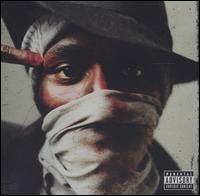

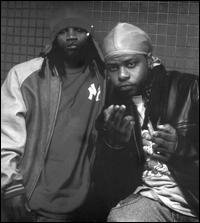 Das EFX's wildly playful, rapid-fire stuttering — dense with rhymes and nonsense words — was one of the most distinctive and influential lyrical styles in early-'90s hip-hop. While the duo completely rewrote the MC rule book, they themselves were increasingly pegged as a one-dimensional novelty the longer their career progressed, despite watching elements of their style creep into countless rappers' bags of tricks. Krazy Drazyz (born Andre Weston; Teaneck, NJ) and Skoob (born Willie Hines) were both raised in Brooklyn, but didn't begin performing together until they met at Virginia State University in 1988. Removed from an active music scene, the two were free to develop their most idiosyncratic tendencies; they started making up gibberish words (anything ending in "-iggity" was a favorite) that added loads of extra syllables to their lines, and wove plenty of pop-cultural references into the tongue-twisting lyrical gymnastics that resulted. Das EFX caught their big break when they performed at a talent show judged by
Das EFX's wildly playful, rapid-fire stuttering — dense with rhymes and nonsense words — was one of the most distinctive and influential lyrical styles in early-'90s hip-hop. While the duo completely rewrote the MC rule book, they themselves were increasingly pegged as a one-dimensional novelty the longer their career progressed, despite watching elements of their style creep into countless rappers' bags of tricks. Krazy Drazyz (born Andre Weston; Teaneck, NJ) and Skoob (born Willie Hines) were both raised in Brooklyn, but didn't begin performing together until they met at Virginia State University in 1988. Removed from an active music scene, the two were free to develop their most idiosyncratic tendencies; they started making up gibberish words (anything ending in "-iggity" was a favorite) that added loads of extra syllables to their lines, and wove plenty of pop-cultural references into the tongue-twisting lyrical gymnastics that resulted. Das EFX caught their big break when they performed at a talent show judged by 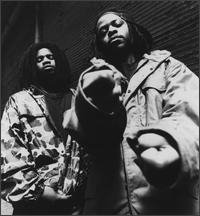 West label, Das EFX began work on their debut album, commuting between Virginia and New York and mailing tapes to
West label, Das EFX began work on their debut album, commuting between Virginia and New York and mailing tapes to 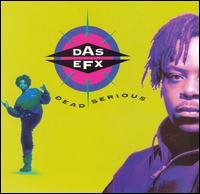
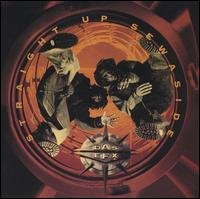

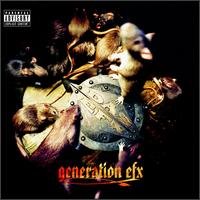
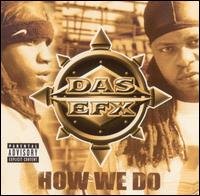 The rap game has changed significantly since the arrival of Das EFX on the scene over a decade ago with 1992's seminal Dead Serious. And if that seems like a long time, consider that the last time Das EFX released a new record was nearly five years ago, and things seem that much more distant. With How We Do, Dray and Skoob try and reestablish themselves as prominent fixtures in the hip-hop game. And while their trademark rap delivery was originally their ticket to notoriety, it is sadly absent throughout the majority of this record. Succumbing to the predictability of subjects such as hustling, women, sex, and murder, How We Do is simply a tedious exercise trying to pander to the lowest common denominator of hip-hop listener. Rather than attempt to raise the bar, or even meet the outstanding levels of early releases, it all seems like an attempt to regain acceptance by a community they believed forgot about them. And while there are moments of brilliance that still show they have the skills to justify their place in hip-hop history, they're simply too few and far between to make for a worthwhile listen. This one is for diehard Das EFX loyalists only, which is a shame, as it's a reminder of just how diluted rap and hip-hop can become at times.
The rap game has changed significantly since the arrival of Das EFX on the scene over a decade ago with 1992's seminal Dead Serious. And if that seems like a long time, consider that the last time Das EFX released a new record was nearly five years ago, and things seem that much more distant. With How We Do, Dray and Skoob try and reestablish themselves as prominent fixtures in the hip-hop game. And while their trademark rap delivery was originally their ticket to notoriety, it is sadly absent throughout the majority of this record. Succumbing to the predictability of subjects such as hustling, women, sex, and murder, How We Do is simply a tedious exercise trying to pander to the lowest common denominator of hip-hop listener. Rather than attempt to raise the bar, or even meet the outstanding levels of early releases, it all seems like an attempt to regain acceptance by a community they believed forgot about them. And while there are moments of brilliance that still show they have the skills to justify their place in hip-hop history, they're simply too few and far between to make for a worthwhile listen. This one is for diehard Das EFX loyalists only, which is a shame, as it's a reminder of just how diluted rap and hip-hop can become at times.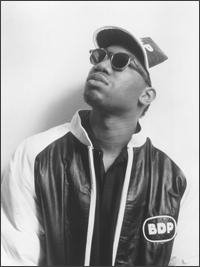 Boogie Down Productions was one of the most important and influential hip-hop groups of the latter half of the '80s. Led by the often brilliant and incendiary MC KRS-One, BDP were pioneers of both hardcore and political (or "conscious") rap — and if that seems contradictory, it also illustrates the scope of KRS-One's talent for chronicling and even shaping his culture. Musically, BDP usually employed spare, minimal backdrops that accentuated KRS-One's booming delivery, and they were also among the very first hip-hop artists to incorporate elements of Jamaican ragga and dancehall into their style. Early on, BDP devoted itself to brash but realistic narratives of ghetto life, which made them a street-level sensation; however, after the murder of original DJ Scott La Rock, KRS-One — who now essentially was BDP — devoted himself to socially and politically conscious material that earned him the nickname "the Teacher." In the process, he helped pave the way for both gangsta rap and the positive, Afrocentric Native Tongues movement — a legacy no other rapper can claim. KRS-One retired the Boogie Down Productions moniker in the early '90s to release records under his own name; to this day, he remains one of hip-hop's most outspoken and respected intellectuals.KRS-One's real name is Laurence Krisna Parker, or simply Kris Parker; some accounts hold that he was born with the "Krisna" moniker, while others suggest it was a nickname given to him during his youth for his interest in spirituality. Born in Brooklyn's Park Slope area in 1965, his Trinidad-born father was deported not long after his birth, and he later adopted his stepfather's last name of Parker. Early in his teens, he dropped out of high school and left home, migrating to the South Bronx; although he survived mostly on the streets and in homeless shelters, he continued his education by studying extensively in public libraries. During this period, he became interested in hip-hop culture, writing his own raps and tagging graffiti under the name KRS-One (originally an abbreviation for "Kris Number One" but later turned into the acronym "Knowledge Reigns
Boogie Down Productions was one of the most important and influential hip-hop groups of the latter half of the '80s. Led by the often brilliant and incendiary MC KRS-One, BDP were pioneers of both hardcore and political (or "conscious") rap — and if that seems contradictory, it also illustrates the scope of KRS-One's talent for chronicling and even shaping his culture. Musically, BDP usually employed spare, minimal backdrops that accentuated KRS-One's booming delivery, and they were also among the very first hip-hop artists to incorporate elements of Jamaican ragga and dancehall into their style. Early on, BDP devoted itself to brash but realistic narratives of ghetto life, which made them a street-level sensation; however, after the murder of original DJ Scott La Rock, KRS-One — who now essentially was BDP — devoted himself to socially and politically conscious material that earned him the nickname "the Teacher." In the process, he helped pave the way for both gangsta rap and the positive, Afrocentric Native Tongues movement — a legacy no other rapper can claim. KRS-One retired the Boogie Down Productions moniker in the early '90s to release records under his own name; to this day, he remains one of hip-hop's most outspoken and respected intellectuals.KRS-One's real name is Laurence Krisna Parker, or simply Kris Parker; some accounts hold that he was born with the "Krisna" moniker, while others suggest it was a nickname given to him during his youth for his interest in spirituality. Born in Brooklyn's Park Slope area in 1965, his Trinidad-born father was deported not long after his birth, and he later adopted his stepfather's last name of Parker. Early in his teens, he dropped out of high school and left home, migrating to the South Bronx; although he survived mostly on the streets and in homeless shelters, he continued his education by studying extensively in public libraries. During this period, he became interested in hip-hop culture, writing his own raps and tagging graffiti under the name KRS-One (originally an abbreviation for "Kris Number One" but later turned into the acronym "Knowledge Reigns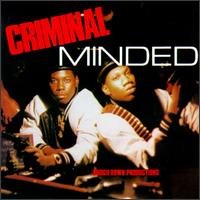
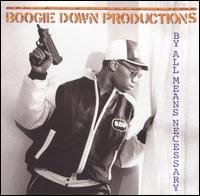
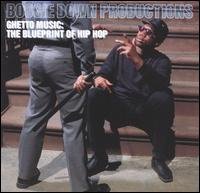 The second Boogie Down Productions album devoted mostly to consciousness raising, Ghetto Music: The Blueprint of Hip Hop finds KRS-One evolving into a fierce advocate for both his community and his chosen art form. He's particularly concerned about the direction of the latter: he's wary of hip-hop being co-opted by the pop mainstream, and the album's title comes from his conviction that real hip-hop is built on the vitality and rebelliousness of the streets. Accordingly, Ghetto Music contains a few more battle rhymes than usual, plus some showcases for pure MC technique, in keeping with the most basic elements of the music. The production, too, is still resolutely minimalist, and even if it's a little more fleshed-out than in the past, it consciously makes no concessions to pop or R&B accessibility. There are more reggae inflections in KRS-One's delivery than ever before, audible in about half the tracks here, and the production starts to echo dancehall more explicitly on a few. Meanwhile, as the Teacher, he's actually put together lesson plans for a couple tracks: "Why Is That?" and "You Must Learn" are basically lectures about biblical and African-American history, respectively. This is where KRS-One starts to fall prey to didacticism, but he has relevant points to make, and the rapping is surprisingly nimble given all the information he's trying to pack in. Elsewhere, "Who Protects Us from You?" is a bouncy anti-police-brutality rap, and KRS closes the album with the point that "World Peace" can only be achieved through a pragmatic, aggressive struggle for equality. Although Ghetto Music has a few signs that KRS is starting to take himself a little too seriously (he dubs himself a metaphysician in the liner notes), overall it's another excellent effort and the last truly great BDP album.
The second Boogie Down Productions album devoted mostly to consciousness raising, Ghetto Music: The Blueprint of Hip Hop finds KRS-One evolving into a fierce advocate for both his community and his chosen art form. He's particularly concerned about the direction of the latter: he's wary of hip-hop being co-opted by the pop mainstream, and the album's title comes from his conviction that real hip-hop is built on the vitality and rebelliousness of the streets. Accordingly, Ghetto Music contains a few more battle rhymes than usual, plus some showcases for pure MC technique, in keeping with the most basic elements of the music. The production, too, is still resolutely minimalist, and even if it's a little more fleshed-out than in the past, it consciously makes no concessions to pop or R&B accessibility. There are more reggae inflections in KRS-One's delivery than ever before, audible in about half the tracks here, and the production starts to echo dancehall more explicitly on a few. Meanwhile, as the Teacher, he's actually put together lesson plans for a couple tracks: "Why Is That?" and "You Must Learn" are basically lectures about biblical and African-American history, respectively. This is where KRS-One starts to fall prey to didacticism, but he has relevant points to make, and the rapping is surprisingly nimble given all the information he's trying to pack in. Elsewhere, "Who Protects Us from You?" is a bouncy anti-police-brutality rap, and KRS closes the album with the point that "World Peace" can only be achieved through a pragmatic, aggressive struggle for equality. Although Ghetto Music has a few signs that KRS is starting to take himself a little too seriously (he dubs himself a metaphysician in the liner notes), overall it's another excellent effort and the last truly great BDP album.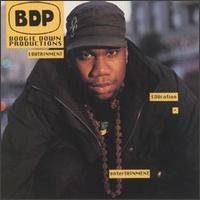 KRS-One's artistic winning streak continued with Edutainment, Boogie Down Productions' fourth album. True to form, he focuses on black history and speaks out on homelessness, racism, police excesses, and materialism with clarity and insight. KRS was often compared to Public Enemy leader Chuck D because of his consistently sociopolitical focus, but there's no mistaking the fact that his unique mixture of black nationalism, Eastern religion (both Hinduism and Buddhism), and Rastafarian philosophy is very much his own. From a commercial standpoint, he had become a little too intellectual and wasn't selling as many albums as many in rap's gangsta school. But from an artistic perspective, Edutainment is as commendable as it is riveting.
KRS-One's artistic winning streak continued with Edutainment, Boogie Down Productions' fourth album. True to form, he focuses on black history and speaks out on homelessness, racism, police excesses, and materialism with clarity and insight. KRS was often compared to Public Enemy leader Chuck D because of his consistently sociopolitical focus, but there's no mistaking the fact that his unique mixture of black nationalism, Eastern religion (both Hinduism and Buddhism), and Rastafarian philosophy is very much his own. From a commercial standpoint, he had become a little too intellectual and wasn't selling as many albums as many in rap's gangsta school. But from an artistic perspective, Edutainment is as commendable as it is riveting.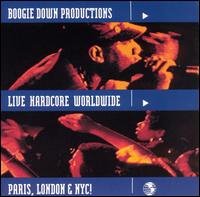
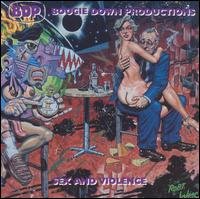
 The rebirth of hip-hop's originating borough the Bronx can be credited in part to this two-man crew. While late-'80s/early-'90s hip-hop had gotten to be mostly party-oriented and at times downright corny, this duo brought back some swagger and soul. Show and A.G. were the first out the box from the superb Diggin' in the Crates Crew, an elite team of MCs and producers who can claim much clout and influence on genuine East Coast hip-hop. The spirit of rap's forefathers can be felt in the gritty weight of this duo's pioneering sound. Learning from their cohort Lord Finesse, the two started an underground buzz by street promoting their demos then selling the tapes out of the trunks of their cars. The street sales helped them polish their debut single "Soul Clap" b/w "Party Groove," a cut that banged dance clubs and got love on Yo! MTV Raps for many a week, a self-titled EP was released in March of 1992. Their debut album, Runaway Slave, followed in the fall and is seen as an early-'90s hip-hop essential. The album brought a bouncing hardcore sound of crisp, jazzy horns, stiff drum kicks, and snapping snares that could get a party hopping but could also satisfy the non-dancing purist nodding his head in the back of the club. The album truly is a D.I.T.C. family affair and introduced such legendary names as the late Big L, Fat Joe, and Diamond D, whose classic debut solo album Stunts, Blunts and Hip Hop dropped the same week in 1992. The albatross of making unadulterated rap music is that it sometimes costs a crew acclaim, for Show and A.G. are some of rap's disturbingly underrated. The sequel to their raw, stripped sound came in 1995 with the under-appreciated Goodfelas and the two were major contributors to D.I.T.C.'s eponymous debut album in 2000.
The rebirth of hip-hop's originating borough the Bronx can be credited in part to this two-man crew. While late-'80s/early-'90s hip-hop had gotten to be mostly party-oriented and at times downright corny, this duo brought back some swagger and soul. Show and A.G. were the first out the box from the superb Diggin' in the Crates Crew, an elite team of MCs and producers who can claim much clout and influence on genuine East Coast hip-hop. The spirit of rap's forefathers can be felt in the gritty weight of this duo's pioneering sound. Learning from their cohort Lord Finesse, the two started an underground buzz by street promoting their demos then selling the tapes out of the trunks of their cars. The street sales helped them polish their debut single "Soul Clap" b/w "Party Groove," a cut that banged dance clubs and got love on Yo! MTV Raps for many a week, a self-titled EP was released in March of 1992. Their debut album, Runaway Slave, followed in the fall and is seen as an early-'90s hip-hop essential. The album brought a bouncing hardcore sound of crisp, jazzy horns, stiff drum kicks, and snapping snares that could get a party hopping but could also satisfy the non-dancing purist nodding his head in the back of the club. The album truly is a D.I.T.C. family affair and introduced such legendary names as the late Big L, Fat Joe, and Diamond D, whose classic debut solo album Stunts, Blunts and Hip Hop dropped the same week in 1992. The albatross of making unadulterated rap music is that it sometimes costs a crew acclaim, for Show and A.G. are some of rap's disturbingly underrated. The sequel to their raw, stripped sound came in 1995 with the under-appreciated Goodfelas and the two were major contributors to D.I.T.C.'s eponymous debut album in 2000.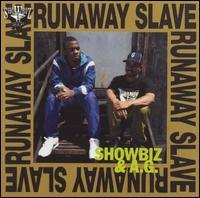
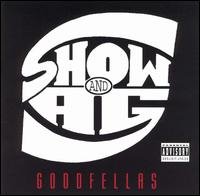 The second shot fired from D.I.T.C.'s charter members Show & A.G. is a shade darker than their debut. While 1992's Runaway Slave was definitely no new jack swing affair, Good Fellas is decidedly more grimy and a lot less playful, both on the production and the lyrical ends. The lead single, "Next Level," also remixed exceptionally on the album by DJ Premier, was the only track that made any above-ground noise. Arguably the best cut on the album, the track is a manifesto of real hip-hop over a melodic guitar sample. Much of the album rumbles along to the tune of low bass grooves and noisy ambient loops of a jazzy variety. From bouncy xylophones to the standard Showbiz horns and kick drums, the production here is tightly constructed. At the time of its release (mid-1995), East Coast hip-hop was cruising along in a rugged gangster mode. All the while an ugly coastal battle was brewing that would conspire to darken hip-hop forevermore. This album steers clear of the coast bashing despite its unmistakable East Coast stamp and appeal. A few tracks do lack a distinct flavor, but overall the methodical, unassuming D.I.T.C. sound here has since been grafted but never duplicated. Show & A.G. affirm that the road to respect-worthy hip-hop status is not through releasing an album every six months, but by letting things marinate for a few years and then proving you're still on top of your game.
The second shot fired from D.I.T.C.'s charter members Show & A.G. is a shade darker than their debut. While 1992's Runaway Slave was definitely no new jack swing affair, Good Fellas is decidedly more grimy and a lot less playful, both on the production and the lyrical ends. The lead single, "Next Level," also remixed exceptionally on the album by DJ Premier, was the only track that made any above-ground noise. Arguably the best cut on the album, the track is a manifesto of real hip-hop over a melodic guitar sample. Much of the album rumbles along to the tune of low bass grooves and noisy ambient loops of a jazzy variety. From bouncy xylophones to the standard Showbiz horns and kick drums, the production here is tightly constructed. At the time of its release (mid-1995), East Coast hip-hop was cruising along in a rugged gangster mode. All the while an ugly coastal battle was brewing that would conspire to darken hip-hop forevermore. This album steers clear of the coast bashing despite its unmistakable East Coast stamp and appeal. A few tracks do lack a distinct flavor, but overall the methodical, unassuming D.I.T.C. sound here has since been grafted but never duplicated. Show & A.G. affirm that the road to respect-worthy hip-hop status is not through releasing an album every six months, but by letting things marinate for a few years and then proving you're still on top of your game. 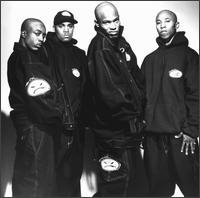 Onyx's shouting, in-your-face brand of high-volume rapping proved to be more at home in the slam pit than on the dancefloor and brought the rap quartet instant chart success. Originally formed in Queens, NY, during 1990, the members of Onyx (Fredro Starr,
Onyx's shouting, in-your-face brand of high-volume rapping proved to be more at home in the slam pit than on the dancefloor and brought the rap quartet instant chart success. Originally formed in Queens, NY, during 1990, the members of Onyx (Fredro Starr, 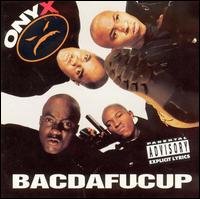

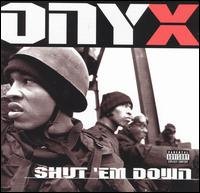
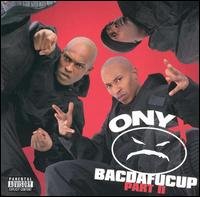
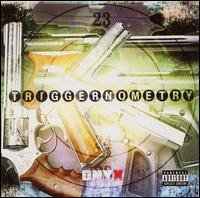
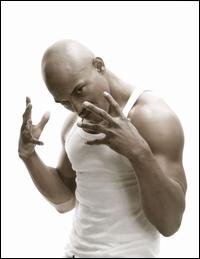 Rapper Sticky Fingaz was the frontman of hardcore rap goup
Rapper Sticky Fingaz was the frontman of hardcore rap goup 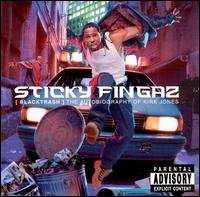
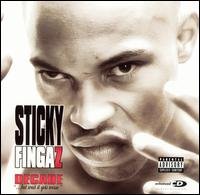
 1 I Ain't Trickin' 4:18
1 I Ain't Trickin' 4:18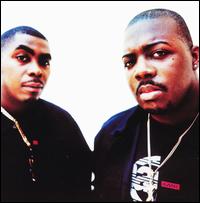 On the surface, the sample-reliant productions and monotone rapping styles of Erick Sermon and Parrish Smith had little to recommend them, but the duo's recordings as EPMD were among the best in hip-hop's underground during the late '80s and early '90s. Over the course of four albums (from the 1988 classic Strictly Business to 1992's Business Never Pesonal), they rarely varied from two themes: dissing sucker MCs and recounting sexual exploits. But a closer look reveals that the duo's rhymes were nothing less than incredible, simply undervalued because of their lack of intonation during delivery. EPMD also had a feel for a good groove, and created numerous hip-hop classics, including "It's My Thing," "You Gots to Chill," "Get the Bozack," "Strictly Business," and "Rampage."Though EPMD's hardcore style influenced the urban-oriented gangsta '90s, Erick Sermon (aka E Double E; b. Nov. 25, 1968) and Parrish Smith (aka Pee MD; b. May 13, 1968) were both raised in the Long Island suburb of Brentwood. They moved into rap separately, with Smith DJing for Rock Squad on a single for Tommy Boy. After coming together in 1987 — naming themselves EPMD, short for "Erick and Parrish Making Dollars" — the duo recorded their debut "It's My Thing" in three hours. The single was later licensed to Chrysalis, and EPMD signed to Sleeping Bag/Fresh
On the surface, the sample-reliant productions and monotone rapping styles of Erick Sermon and Parrish Smith had little to recommend them, but the duo's recordings as EPMD were among the best in hip-hop's underground during the late '80s and early '90s. Over the course of four albums (from the 1988 classic Strictly Business to 1992's Business Never Pesonal), they rarely varied from two themes: dissing sucker MCs and recounting sexual exploits. But a closer look reveals that the duo's rhymes were nothing less than incredible, simply undervalued because of their lack of intonation during delivery. EPMD also had a feel for a good groove, and created numerous hip-hop classics, including "It's My Thing," "You Gots to Chill," "Get the Bozack," "Strictly Business," and "Rampage."Though EPMD's hardcore style influenced the urban-oriented gangsta '90s, Erick Sermon (aka E Double E; b. Nov. 25, 1968) and Parrish Smith (aka Pee MD; b. May 13, 1968) were both raised in the Long Island suburb of Brentwood. They moved into rap separately, with Smith DJing for Rock Squad on a single for Tommy Boy. After coming together in 1987 — naming themselves EPMD, short for "Erick and Parrish Making Dollars" — the duo recorded their debut "It's My Thing" in three hours. The single was later licensed to Chrysalis, and EPMD signed to Sleeping Bag/Fresh 
